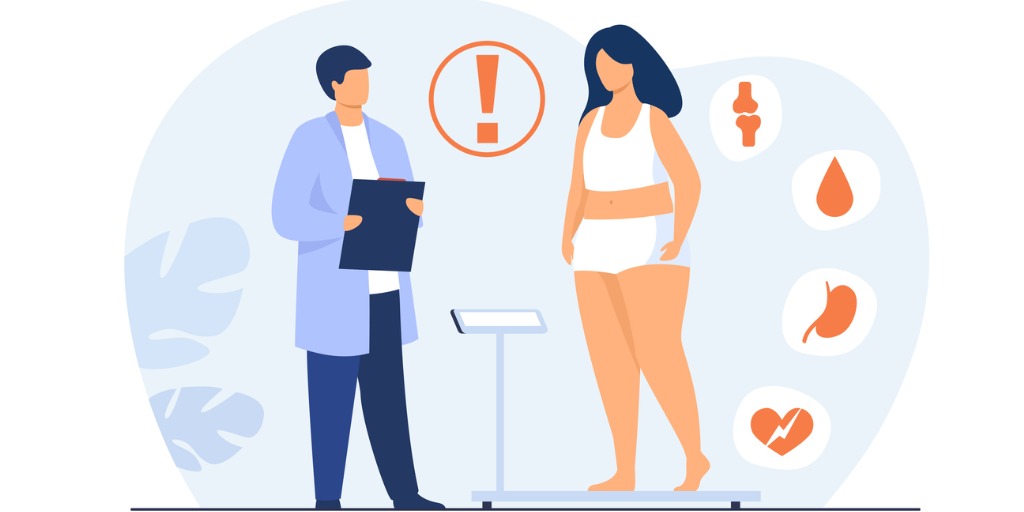How to support patients dealing with pandemic weight gain and obesity
Obesity has been headlined as a growing epidemic throughout the United States in adults and children over the last twenty years. So, when the pandemic shut down gyms and kept people confined to their homes, it made sense that undesired weight change increased for many; 61% in fact, according to a study by the American Psychological Association. Learn more about the relationship between the pandemic & weight gain and how to support patients dealing with obesity.
| In this post: |
Knowing this, the data points at a specific increase in weight gain connected to the impact the pandemic has had on people over the last year. The APA found that the average weight gain from surveyed respondents was 29 pounds—and more than 50 pounds for 10% of respondents.
Emotional worries can lead to weight gain
For many, our standard routines have been disrupted for more than a year because of COVID-19. For the safety of our health, we were advised to prioritize social distancing. So for those that were used to exercising at a public gym or outdoor venue, they had to find new ways to get physical activity. Options to exercise were limited to a person’s living space or access to virtual workout plans, pushing many to cope with unhealthy habits, for example, drinking. One study found that 60 % of U.S. adults' alcohol consumption increased due to the pandemic.
Close behind an increase in drinking habits was emotional eating. Food consumption became much more accessible with most people working at home, steps away from their kitchen. Yarisbel Melo Herrera, a graduate practicum student in the Nutrition and Wellness Service at Brigham and Women's Hospital, offers the following seven tips for managing stress and emotional eating:
- Be aware that your eating patterns might change—Make sure you're eating healthy foods full of nutrients and drinking plenty of water.
- Self-reflect on your eating—Keeping a food log, an "emotional" food log or journal can help you become more aware of your food choices.
- Be present—To eat mindfully, remove distractions (namely screens, like TVs, cell phones, and laptops), avoid eating directly from the package, and focus on foods' sensorial properties (smell, taste, texture).
- Monitor your overall health—It's always a good idea to reach out to loved ones or health care professionals if feelings of stress persist.
- Get enough sleep—Research has found that getting too little sleep is related to both overeating and an increased desire for energy-dense (high calorie) foods.
- Try to keep a daily routine—Having regular times for meals and snacks may help some people avoid mindless trips to the kitchen.
- Practice self-compassion—Feeling guilty, shameful, or angry towards yourself can continue the emotional eating cycle.
How providers can help patients dealing with weight gain and obesity
Angela Fitch, MD, Associate Director of the Massachusetts General Hospital Weight Center and faculty at the Harvard Medical School, advises removing the stigma around obesity to treat and improve patients' lives. She spoke more on a podcast episode of Charged: Stories from the women leading health care, recalling that there was no focus on obesity in medical school or residency. But, everything changed when the American Medical Association defined obesity as a chronic disease. Although nutrition is becoming more of an overall focus in the medical world, it's a slow transition. Historically, nutrition hasn't included how the human body interacts with its food environment, what it does with that food energy, and how that relates to obesity. The disease of obesity is a storage of excess body fat, but abnormally. It's not as simple for some as eating less and exercising more—it's a lifelong focus that people need help tackling. Partnering with providers is key to patients dealing with obesity effectively. For example, working with dieticians, identifying lifestyle changes, and changing physical activity can help lead to better patient outcomes. Listen to the entire episode for more of Angela's advice on weight loss and obesity. You can also learn more about her work at the Massachusetts General Hospital Weight Center: a fully integrated program that supports the spectrum of needs for people of all ages seeking help with obesity and weight loss.
